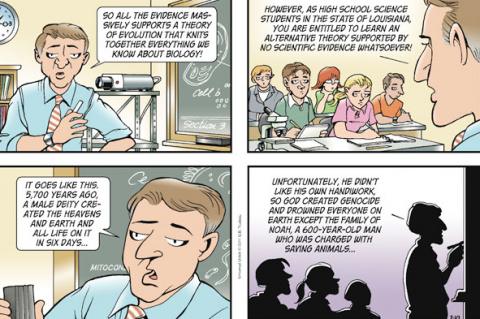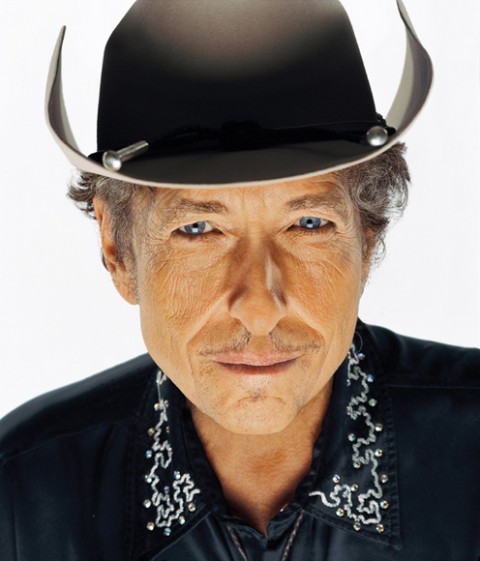Al Jazeera forced many Westerns viewers to take their reporting seriously during the Egyptian uprising this spring, and now the Qatar-based news network has released a timely reportage (Aug. 2) on the fault lines in America — on the gap between rich and poor that only grew wider this week. Alexis de Tocqueville they’re not. There’s no subtle sociology here. But, at the same time, I suspect that this foreign perspective on the U.S. won’t appear unfamiliar to many Americans. The program runs 24 minutes, and other shows in the Fault Lines series can be viewed on YouTube here. H/T @courosa
Animated: Stephen Fry & Ann Widdecombe Debate the Catholic Church
Intelligence Squared (iTunes – Feed – Web Site) brings Oxford-style debating to America. Each debate features one motion, one moderator, and three panelists arguing for a motion, and three arguing against. Should Airports Use Racial and Religious Profiling? Is Islam A Religion Of Peace? Is The Two-Party System Making the U.S. Ungovernable? These are some of the recent topics that have been tackled.
Now, taking a page out of the RSA playbook, Intelligence Squared has produced a short animated video that gives artistic life to a debate held in October 2009. The motion — “The Catholic Church is a force for good in the world” — was supported by Ann Noreen Widdecombe, a former British Conservative Party politician turned novelist. And taking the contrary position was popular British actor and writer Stephen Fry.
You can watch the animated version above, and the full debate (which also featured Christopher Hitchens) here. More iq2 videos can be found at their Youtube Channel, which otherwise appears in our collection of Intelligent YouTube Channels. H/T @joabaldwin
Related Content:
Stephen Fry on Philosophy and Unbelief
Stephen Fry: What I Wish I Had Known When I Was 18
Stephen Fry Gets Animated about Language
Doonesbury Confronts Creationism in the Classroom
 Garry Trudeau has taken on creationism before. He’s doing it again, this time commenting on the oxymoronic “Louisiana Science Education Act,” which allows the teaching of creationism in the public classroom. You can view Trudeau’s cartoon in full, and in high res here.
Garry Trudeau has taken on creationism before. He’s doing it again, this time commenting on the oxymoronic “Louisiana Science Education Act,” which allows the teaching of creationism in the public classroom. You can view Trudeau’s cartoon in full, and in high res here.
Renata Salecl: The Paradox of Choice
With freedom come choices. Every choice is an opportunity to select the best possible outcome, the one that would make us happiest. More choices lead to more happiness, right? Of course we find the opposite to be true. As choices increase, so does anxiety. In the latest installment of the RSA animated lecture series, Slovenian social and legal theorist Renata Salecl argues that this anxiety, coupled with the capitalist ideal of the self-made person, leads to a kind of social paralysis. “Today’s ideology of choice,” says Salecl, “actually pacifies people and makes us constantly turn criticism to ourselves instead of organizing ourselves and making a critique of the society we live in.” The animated feature was adapted from a lecture Salecl gave last summer in London. (You can watch the entire lecture here.) It draws on ideas presented in her book, Choice.
Other RSA Videos:
Sir Ken Robinson: A Creative Education
Good Capitalist Karma: Zizek Animated
Smile or Die: The Perils of Positive Psychology
Steven Pinker: How Innuendo Makes Things Work
My Water’s On Fire Tonight: The Fracking Song
In 2005, Vice President Dick Cheney personally engineered a loophole in the U.S. energy bill exempting companies that use an oil- and gas-drilling procedure known as hydraulic fracturing, or “fracking,” from regulation under the Safe Drinking Water Act. As a result, tons of diesel fuel and assorted chemicals–some of them toxic, like benzyne–are injected at high pressure into the earth at the sole discretion of the companies doing the injecting. One of the chief beneficiaries of Cheney’s string-pulling is the company that invented the procedure, Halliburton, which employed Cheney as chairman and CEO just prior to his becoming vice president. (A coincidence?)
In the wake of the Halliburton Loophole, as it has come to be known, there have been a growing number of water pollution cases, from Pennsylvania to Colorado, associated with fracking. Some of those cases were documented in last year’s Sundance Film Festival award-winning documentary, Gasland, by Josh Fox, who said in a PBS interview, “I could take a car battery and throw it in the watershed and go to federal prison, but these guys can take the same chemicals and inject it by the thousands of gallons, and they’re exempt. It makes no sense.”
It’s a serious issue involving two of America’s vital interests–the need for energy and the need for safe drinking water–but a group of journalism students in New York University’s Studio 20 master’s program, in association with the public-interest journalism group ProPublica, has taken a light-hearted approach, creating a music video to raise awareness of fracking. It’s called “My Water’s on Fire Tonight (The Fracking Song).” The purpose of the project, according to group leader David Holmes, is to encourage people to read ProPublica’s reporting on the issue. “We were concerned with building a better entryway into that investigation,” Holmes told Poynter.org, “and we figured a song would be the perfect way to do it–especially since it’s called fracking.”
via Explainer.net
Don’t Dance at the Jefferson Memorial: A Quick PSA
Anyone know what law these dancers were violating, since the arresting officer apparently doesn’t know (or won’t say)?
Update: This article/post gives you the backstory. It explains that the dancers were “there protesting a … court decision [handed down] earlier this month that upheld a ban on dancing within the memorial.” The members of the “civil danceobedience” were charged with demonstrating without a permit, and then released a short time after. That’s the answer to the question, in short…
via BoingBoing
Jon Stewart & Bill O’Reilly Debate Rapper’s Visit to the White House
The culture wars wage on. Almost twenty years after the great Murphy Brown debate, we’re still going at it. But now, instead of debating the pros and cons of single motherhood, the focus has turned to whether Michelle Obama erred in inviting the rapper Common to the White House Poetry Night last week. (See his actual performance here.) Critics point to this 2007 YouTube video, A Letter to the Law, though they don’t necessarily listen until the very end. And they also flag his sympathetic words directed toward Joanne Chesimard (aka Assata Shakur), an ex-Black Panther, convicted of killing a New Jersey police officer in 1973. This all built up to the latest Jon Stewart — Bill O’Reilly faceoff, which drilled down to the question: Did the First Lady make a major gaffe? Or is this another case of selective outrage? Part 1 is above; Part II is here…
via @Frauenfelder
Bob Dylan Answers China Charges
 Just last month, Bob Dylan played his first concert in China at the Worker’s Gymnasium in Beijing. It wasn’t exactly a big show. Roughly 2,000 people attended, but it became a big affair at home when NYTimes columnist Maureen Dowd wrote a caustic op-ed, accusing Dylan of playing a censored set stripped of his revolutionary anthems. In short, she declared, Dylan went to China and sold out his 60s soul:
Just last month, Bob Dylan played his first concert in China at the Worker’s Gymnasium in Beijing. It wasn’t exactly a big show. Roughly 2,000 people attended, but it became a big affair at home when NYTimes columnist Maureen Dowd wrote a caustic op-ed, accusing Dylan of playing a censored set stripped of his revolutionary anthems. In short, she declared, Dylan went to China and sold out his 60s soul:
Iconic songs of revolution like “The Times They Are a‑Changin,’ ” and “Blowin’ in the Wind” wouldn’t have been an appropriate soundtrack for the 2,000 Chinese apparatchiks in the audience taking a relaxing break from repression.
Spooked by the surge of democracy sweeping the Middle East, China is conducting the harshest crackdown on artists, lawyers, writers and dissidents in a decade. It is censoring (or “harmonizing,” as it euphemizes) the Internet and dispatching the secret police to arrest willy-nilly, including Ai Weiwei, the famous artist and architect of the Bird’s Nest, Beijing’s Olympic stadium.
Dylan said nothing about Weiwei’s detention, didn’t offer a reprise of “Hurricane,” his song about “the man the authorities came to blame for something that he never done.” He sang his censored set, took his pile of Communist cash and left.
Now, in a note to fans, Dylan took the rare step of responding to these (and other) accusations in a short letter published yesterday. He writes:
As far as censorship goes, the Chinese government had asked for the names of the songs that I would be playing. There’s no logical answer to that, so we sent them the set lists from the previous 3 months. If there were any songs, verses or lines censored, nobody ever told me about it and we played all the songs that we intended to play.
I’m guessing this response will only partly satisfy Dowd. Perhaps Dylan didn’t change his set to please the apparatchiks. But did he miss an opportunity to make the right statement? Just maybe. But no matter, we’re putting this behind us and getting ready for Dylan’s 70th birthday on May 24. We still love him, warts and all…

